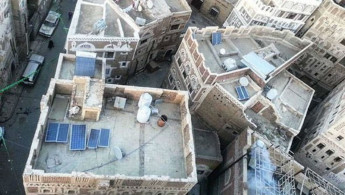Yemenis turn to solar energy amid electricity blackouts
For many of the country's rural residents, electricity was always a commodity usually reserved for city-dwellers.
But today, beset by war and devastating air and naval blockades, those who once could afford the luxury of fuel-guzzling generators have found in solar-panels suitable alternatives.
Yemeni citizen Ahmad Faisal tells The New Arab how he sold some of his wife's most expensive possessions to buy solar panels.
"The war has forced us to use all our savings," said Faisal, "The last thing we had were my wife's jewellery, so I sold most of it to buy solar panels to light up my home, which has been in darkness since the start of the war."
One solar panel can power four light bulbs, a television and a washing machine for six hours. However, it comes with a hefty price tag.
"The price of a solar panel package that allows citizens to no longer rely on the state electricity supply can come up to 1500 USD," Ahmad Abd al-Mawla, a solar vendor in Yemen, tells The New Arab.
 |
|
| Boy in Yemen charges his mobile phone using a solar panel [Twitter] |
But while the initial investment may be expensive, and out of the reach of many Yemenis forced into a life of rampant poverty, the life span of a solar panel is about 10 years and can guarantee a steady supply.
Sensing increasing potential for profit, many Yemeni businesses affected the war have now ventured into solar energy.
"We come across bakeries, and shops that sell car parts, who are now also selling solar panels," Abd al-Mawla said.
With increasing availability, the use of solar panels is becoming widely spread across the country.
"I spent a lot of money on solar panels to light up my house and work household appliances," Abdul all-Wafi al-Sharbi told The New Arab, "I am convinced that we will not use [state-supplied] electricity again like we used to years ago."
"We may be the only people in the Arab world who have resorted to using electrical appliances that run on solar energy as we have completely stopped relying on [state-supplied] electricity," Sharbi added.
A Ministry of Electricity and Energy official told The New Arab that at least 40% of people in Yemen today are relying on solar energy.
"A lot of citizens have asked us to remove electricity meters from their homes because they are not using electricity anymore," Salim Abdulkarim, told The New Arab.
If Yemenis become self-sufficient and continue to rely on solar energy, a burden will be lifted off the government, Abdulkarim added.
Amid of a bloody war that is inflicting unbearable hardships on the local populace, the turn to self-reliance and renewable energy maybe one of the faintest silver linings in a country whose national budget was often decimated by state subsidies for energy.



